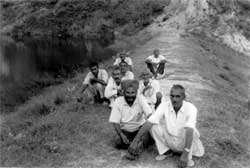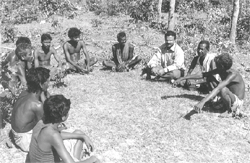Gujarat announces Rs 13 crore scheme for state's poor
gujarat chief minister Narendra Modi on March 29, 2007, announced a Rs 13-crore scheme for the state's urban poor. The programme, called Garib Samriddhi Scheme, envisages, among other things,
gujarat chief minister Narendra Modi on March 29, 2007, announced a Rs 13-crore scheme for the state's urban poor. The programme, called Garib Samriddhi Scheme, envisages, among other things,

Every new case of polio in the country should henceforth be treated as a "public health emergency'. This suggestion was made by the India expert advisory group on polio, with a view to eradicating
a disaster in the making? This question is being raised about a proposal of Quebec's largest utility company, which plans to build 36 new dams on 24 rivers across the province. If implemented, the
Ultimately, it could be a victory for the much abused environment. With US industries and environmentalists at loggerheads for the past one year over the now familiar tug-of-war between
An EU non proposal on agri subsidies
THE upcoming Union Budget should have a special focus on women and farmers. This message was conveyed by Congress chief Sonia Gandhi while speaking at a function in her constituency, Rae Bareli, on Wednesday, where she expressed certainty that finance minister P Chidambaram would "keep the common man's difficulties, especially faced by women and farmers, in mind while preparing the budget'. Speaking at a Bank of Baroda function to launch the 1,000th self-help group, Ms Gandhi was also quoted by agencies as saying that while 8-9% economic growth was not a mean achievement, real happiness would come when the common man's difficulties are wiped out. She added that health and education were keys for achieving real happiness. The comments are politically significant as many in the Congress have been saying much the same thing. At a pre-budget meeting with Mr Chidambaram recently, Congress leaders pointed out that 9% growth alone growth was unlikely to pay dividends for the party in an election year. They had asked the FM to focus on the
Chidambaram may try to shift attention from high prices of essentials If everybody, including political parties, is talking about farmers it must be election time. Close to election, it has become more or less a trend for the government of the day to announce sops for the agriculture and rural sectors in its budget proposals. So even while the common man has to swallow the bitter pill of the "inevitable' petrol and diesel hike before the 2008-09 budget, there is a promise of a "populist budget' for farmers and the aam garib aadmi this year. Low growth rate With several States going to the polls this year ahead of the next year's Lok Sabha election, there may be an attempt to shift the attention from the high prices of essential commodities, low growth rate (2.3 per cent in the 10th Plan) in agriculture, the disconnect between a high Gross Domestic Product and the rural sector, with problems of displacement, migration, unemployment, suicides by farmers and impending food crisis. This budget is most likely to convey the last ditch attempt of the Congress-led United Progressive Alliance (UPA) government to redeem itself from the scars caused in the countryside by farmer suicides and dispossession of rural families on account of Special Economic Zones and other industrialisation projects. Without doubt, the Debt Relief Package for Institutional Loanee Farmers (as reported first in The Hindu) and the expansion of the National Rural Employment Guarantee Act (NREGA) Programme will be at the centre of Finance Minister P. Chidambaram's budget proposals. Fertilizer policy Besides, it is expected that he will unveil a rationalised fertilizer policy to encourage balanced use of fertilizers, especially muriates, to revive farm soil. Some succour is also essential for the wives of indebted farmers who committed suicide. There is a growing demand to strengthen the National Agriculture Insurance Scheme (NAIS) and to have a Health Insurance Scheme for farm households, as various surveys showed that most the credits in the informal sector were not only farming related but also to meet the requirements of health, celebrations and even life-style. From all accounts, the pilot weather-based crop insurance may be expanded. Fund requirements It is estimated that the total fund requirement for the expansion of the NREGA from the present 330 districts to 600-odd will be about Rs. 16,000 crore. On the other hand, the debt relief, covering an estimated 35 per cent farmers who had availed themselves of bank loans, is estimated at Rs. 40,000 crore in the first year. The Union government will pay off the dues to banks. A Price Stabilisation Fund is also proposed to be set up with contributions from the government, banks and farmers. Well-placed sources hinted that the Finance Minister may cull out unspent funds from social sectors such as rural development, education and health to partially meet the requirement of the Farmers' Debt Relief Package. It is anybody's guess if the Minister will reduce the interest rate on farm loans from the current 7 to 4 per cent as recommended by the National Commission on Farmers. There is also a demand to raise the credit limit under the Kisan Credit Card scheme. There is an expectation that enhanced budgetary support will continue for the flagship rural programmes, including the swarozgar yojana (self-self groups), Pradhan Mantri Gram Sadak Yojana, Indira Awas Yojana and the Drinking Water Supply programme. The highest increase, however, is expected in the Land Resources Programme under the Integrated Wasteland Management Programme. In the agriculture sector, allocation has to be enhanced for the Rashtriya Krishi Vikas Yojana to enhance production and productivity and to the National Food Security Mission to increase the output of rice, wheat and pulses. Both schemes are new and yet to take off. Irrigation schemes, horticulture mission and agriculture research will get the customary support, as growth in farm "allied sectors' comes from these areas. The National Rainfed Area Authority is most certainly likely to get financial support. Food subsidy The food subsidy bill is likely to cross the Rs 30,000 crore-mark. This is due to the wide difference between the minimum support prices (MSP) paid to farmers and the central issue price of grains sold through the Public Distribution System, as well as on account of the food grains import bill. The subsidy bill to go up further as the food grain stocks are expected to dwindle by April 1, possibly resulting in more imports. With apprehensions of an avian influenza pandemic, a comprehensive rehabilitation package for the poultry industry and bird flu-affected farmers, as part of a Bio-Security Policy, will be announced in the budget, if not earlier. However, the package may include only such poultry farmers, who get linked to institutional poultry farms and the industry. It remains to be seen how the government's packages will play out for the thousands of those in the informal sector who do not have the income and the collateral to avail themselves of institutional loans. Funds utilisation It is expected that in this last year of the UPA government's regime, the emphasis will be on consolidation, with focus on better implementation, monitoring and utilisation of funds. In particular, the Congress has shown signs of being zealous of taking credit for the central funds made available to States, to reap a harvest during election time. The biggest challenge, however, is making agriculture viable for the 82 per cent small and marginal farmers and bailing them out of the clutches of the informal system of borrowing.
WAFED is an independent national network of people affected by water and energy projects as well as of local concerned groups in Nepal. Some of its members are individual activists engaged in the field
The Rural Electrification Board of Bangladesh has been providing service to rural member consumers for over 30 years. Continued support from the Government of Bangladesh, the donor community, consulting
DEVE GOWDA's anti-environment measures never seem to come to an end. Before becoming the Prime Minister (PM), Deve Gowda had said in an interview to Down To Earth (DTE): "Often people are being

The people of Salehpur get a raw deal from the forest department of Haryana in return for the services rendered by them

The anti people attitude that environmental NGOs had vehemently opposed in the '80s has resurfaced in the recent draft Forest Policy Bill. The author examines why the NGOs failed to influence brain dead government policies

Thupstan Chhewang, Chief Executive Councillor and chairperson of the Ladakh Autonomous Hill Development Council LAHDC speaks to Down To Earth.

Impending doom has prompted villagers in Bihar and Orissa to protect their forests from natural calamities. And humans

Beef, the staple food of the British, finds itself out of favour as a ban on its sale sweeps across UK and also the European Union

I WOULD like to strongly denounce the message sent by Rajesh Pilot to this august assembly to discuss people's management of the Riljaji National Park by the Van Gujjars. It appears from his message
What Canada wants in the UN from a forest convention is a mystery. Is it pushing a convention to protect its own economic interests in forestry?

The micro watershed development project in Maharashtra has put a stop to what was earlier an annual ritual of deserting the drought prone villages of Marathwada by their residents

Every village has its own way of protecting the forests, but each one is a success story

Extracting minerals and ornamental stone in the Aravallis despit its environmental costs is such a flourishing economic activity that political parties are vying with each other to protect it. Because most mine workers have no other livelihood, they r